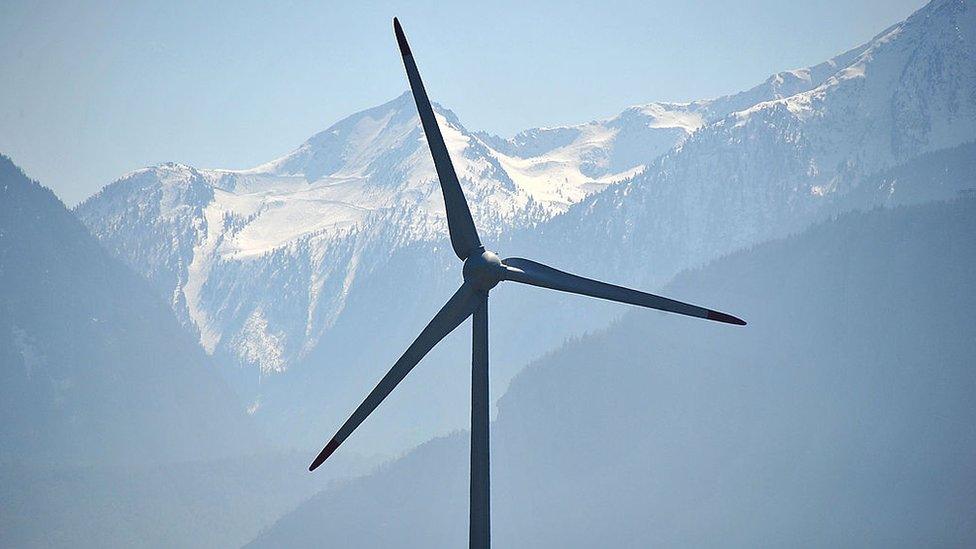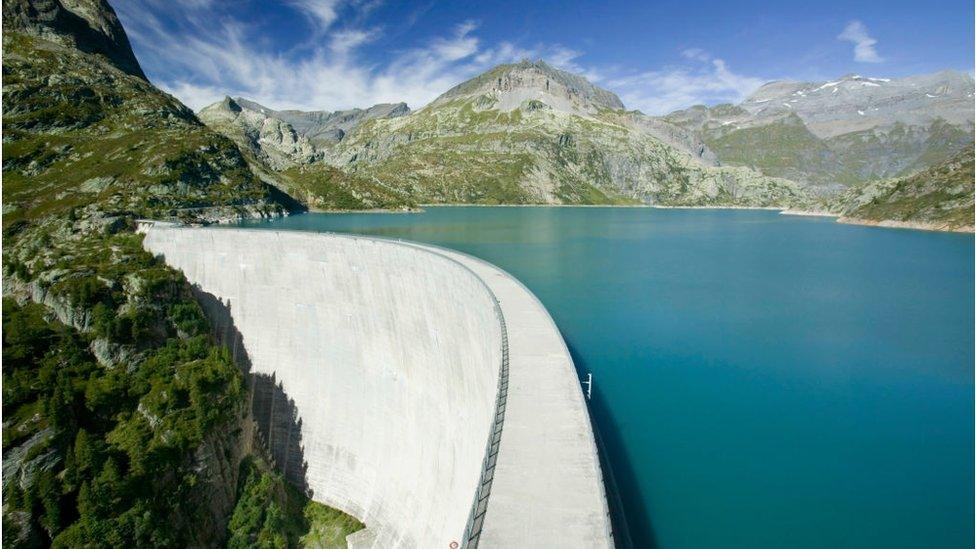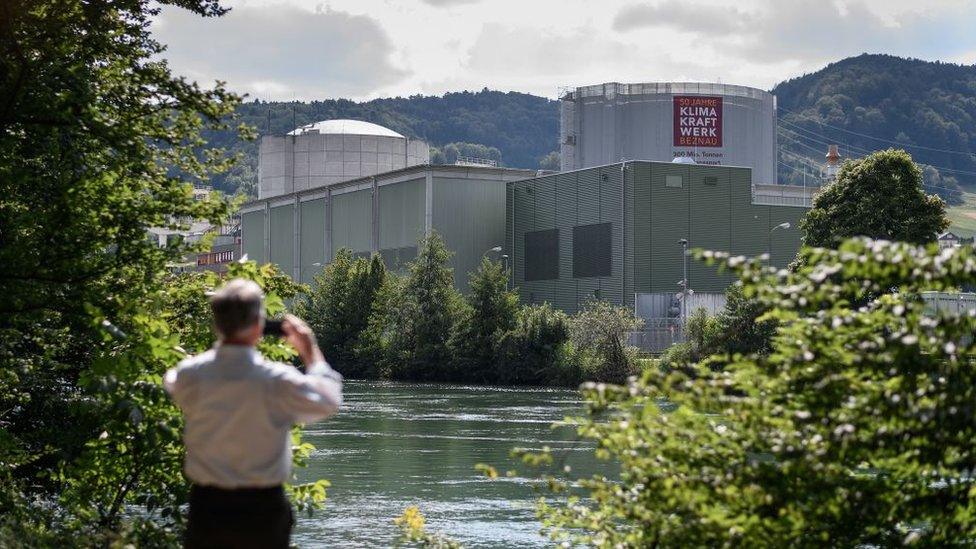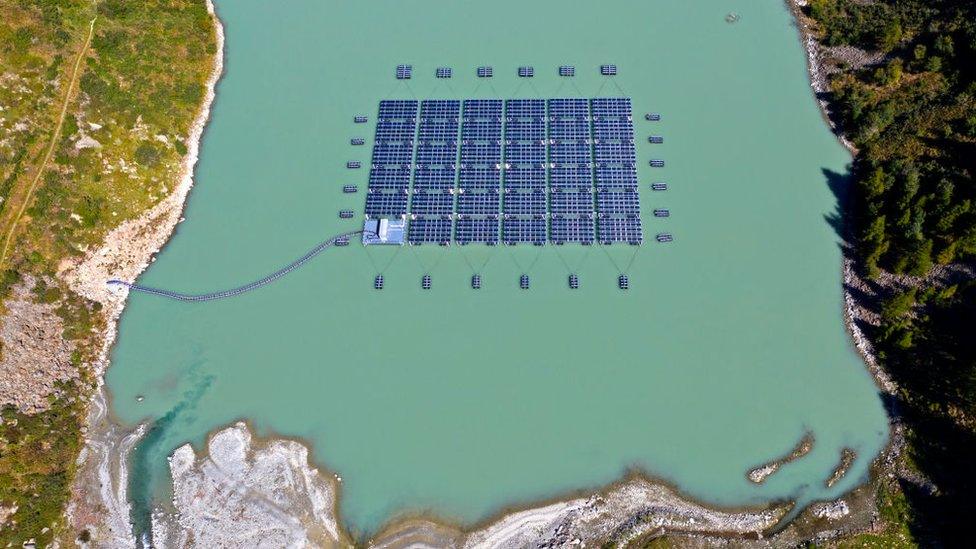Climate change: 'Default effect' sees massive green energy switch
- Published

Swiss consumers have stayed with green energy tariffs despite the increased costs
When Swiss energy companies made green electricity the default choice, huge numbers of consumers were happy to stick with it - even though it cost them more.
Four years after the switch, researchers found that around 80% of customers were still on green tariffs.
This "default effect" happened partly because people didn't want the hassle of switching back to fossil fuels.
The authors say the idea could have a big impact on global emissions of CO2.
In the study, the researchers looked at what happened when two Swiss energy suppliers changed the default electricity offering for their customers from a mixture of fuels to renewables only.
This change affected around 234,000 private households and 9,000 businesses.
Before the switch, the numbers choosing to have green power were at around 3%. Afterwards, this rose to 80-90% of customers.
Residential consumers had to pay at least 3-8% more for their energy on the green tariff, while businesses saw their costs increase by up to 14% for energy used at night.

Hydropower is a major component of the Swiss energy mix
Remarkably, these extra costs weren't enough to push consumers to change their tariffs back to ones with fossil fuels in the mix.
"It is worth noting that even five years after the change, some 80% of the households are still sticking with green electricity," said co-author Dr Jennifer Gewinner, from ETH Zurich, a public research university in Switzerland's largest city.
It was a similar story for small business customers. Several years after the switch, more than 70% were still on the more expensive green tariff.
In the case of large companies, which had considerable choice in terms of which energy provider to go with, the vast majority stayed with green energy even though it was costing them around $2,300 extra per year.
The researchers believe that what they are observing is the surprising power of the default effect.
This is a widely known phenomenon in different spheres, such as in organ donation, where laws have changed in many countries so that the people have to opt out if they don't want to donate after death.

Europe's oldest operating nuclear power plant at Beznau has long been controversial in Switzerland
A more mundane example is with double-sided printing, which has become the default in many offices to reduce wastage.
However, the authors of the Swiss study were surprised that this effect held up so well with energy, considering the greater costs involved.
The researchers believe that some of the reluctance to change is down to the human condition.
"You have to switch to the other cheaper tariff bills actively," said team leader Prof Andreas Diekmann, from ETH Zurich.
"You can do it by email or by a phone call, but many people just don't do it."
As well as people's inherent reluctance to tackle the paperwork involved in changing back to fossil fuels, there were other factors at play.
"People are a bit overwhelmed because it is a hard topic to actually feel competent to choose your own tariff," said Dr Gewinner.
"So if you help them and tell them we are all moving now to renewable energy, they feel okay. It was kind of what they wanted to do anyway.
"I think that's what makes default settings stick so much, because we understand that it's the recommended product, like the safe choice."
One of the concerns that suppliers have about green energy tariffs is that customers will increase their overall use of electricity because they feel that it's clean and sustainable.
Over the six-year period of the study, the researchers found no evidence of greater consumption among those using renewable power.
The authors also believe that moving to a green default setting would have a major impact on carbon dioxide emissions, particularly in countries with a high reliance on fossil fuels such as the US, China or Germany.
"We made a simulation for Germany with data from 2018," explained Prof Diekmann.

High altitude floating solar panels indicate that Switzerland is exploring more green options
"We figured out that when all companies would do it only for their private customers, the saving was 45 million metric tonnes of carbon dioxide. That's a big impact, equal to about 5% of all the CO2 emissions in Germany."
But would this idea work if every energy supplier offered a green default - is there enough green energy to go around?
"The companies we work with, they were also afraid that they would need more renewable energy than they were able to support," said Dr Gewinner.
"But I think what our study does is help is to give you an estimate, of how many customers in your household sector and in your business sector will be likely to stick with green energy, and that will help the companies to actually calculate."
Dr Gewinner believes the idea should be applicable all over the world.
"Changing people's attitudes and beliefs takes a lot of time," she told BBC News.
"But we can do this without changing people's belief structures, but just by being human."
The study has been published, external in the journal Nature Human Behaviour.
Follow Matt on Twitter., external.